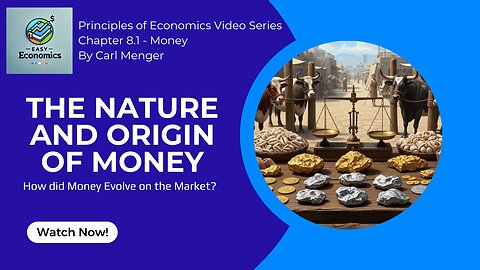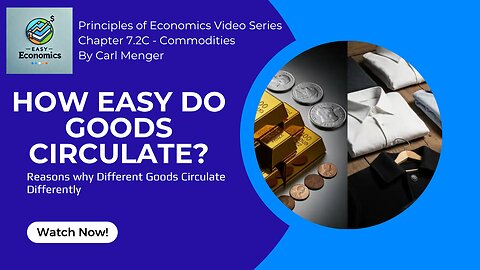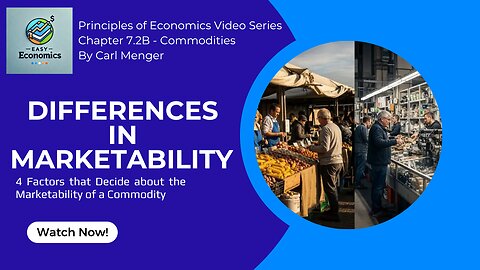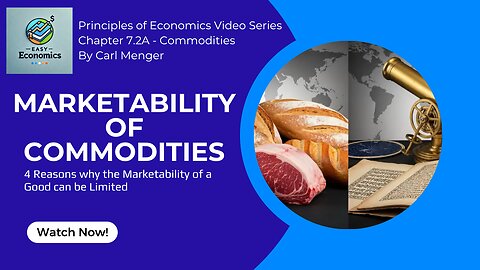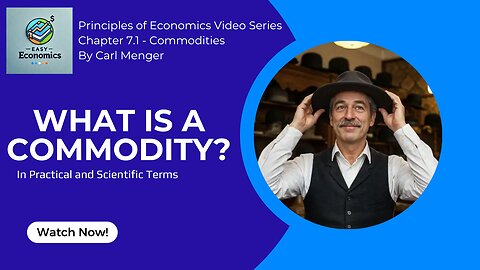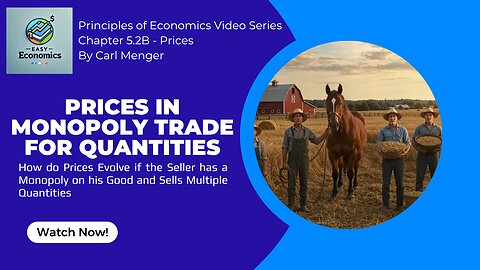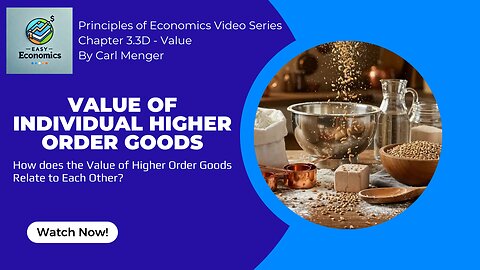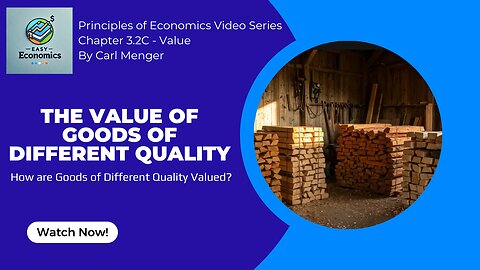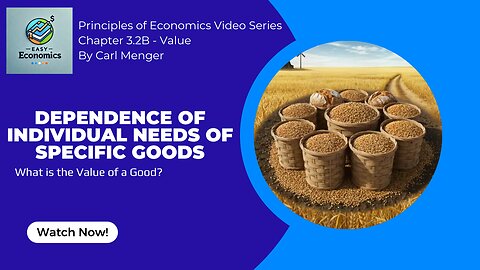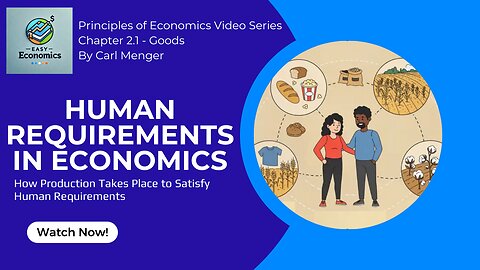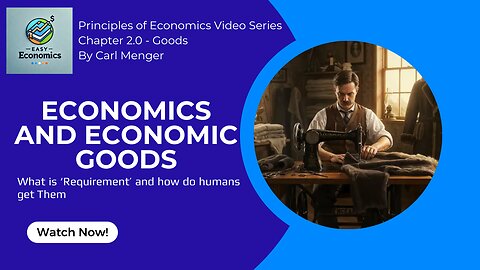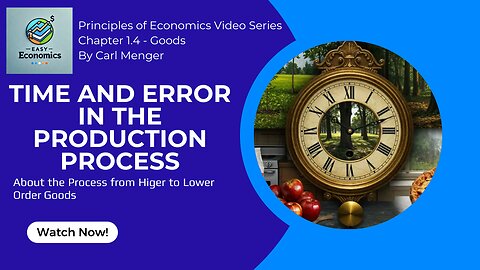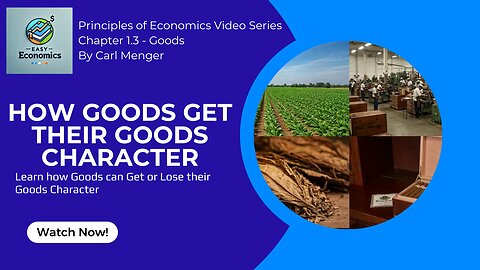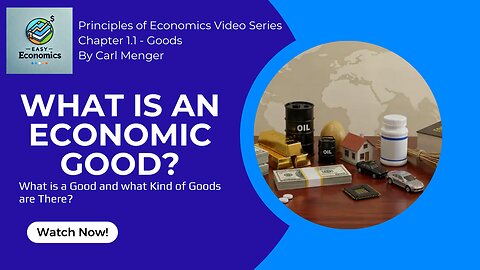Premium Only Content
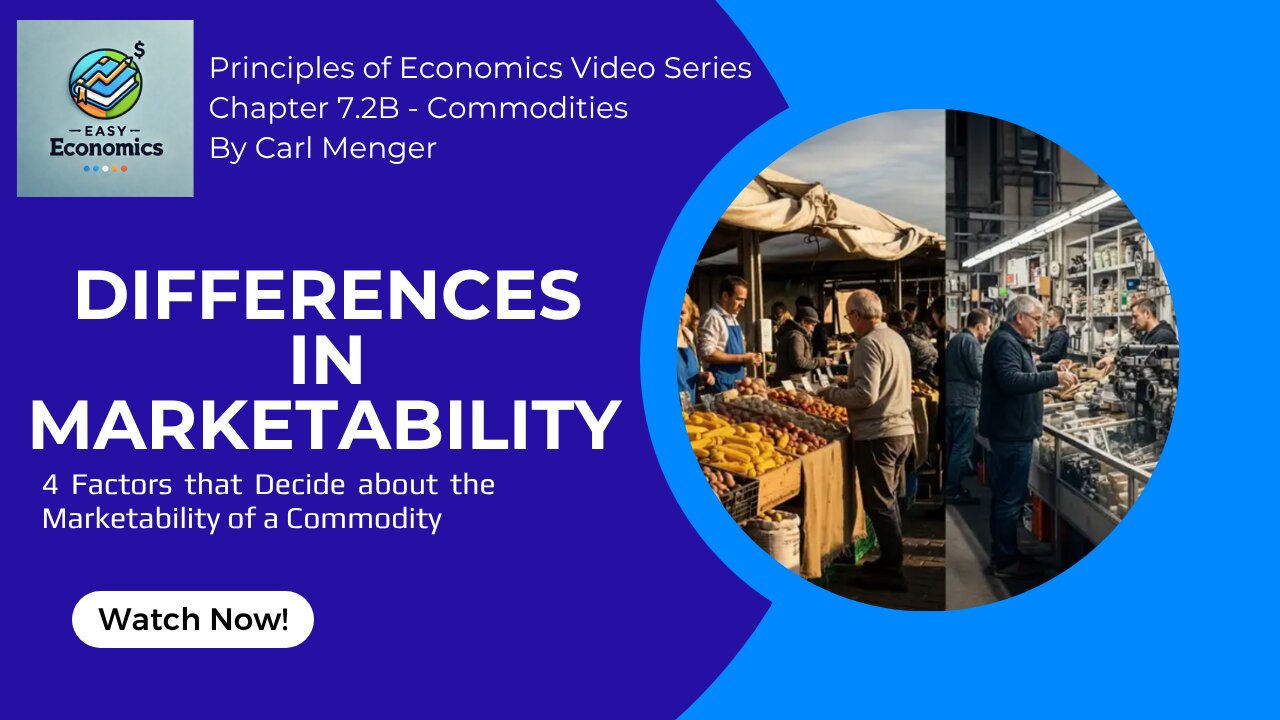
Principles of Economics by Carl Menger Chapter 8.1 - The Nature and Origin of Money
Principles of Economics by Carl Menger Chapter 7.2C - Circulability of Commodities
Principles of Economics by Carl Menger Chapter 7.2B - Differences in Marketability of Commodities
Principles of Economics by Carl Menger Chapter 7.2A - Marketability of Commodities
Principles of Economics by Carl Menger Chapter 7.1 - What is a Commodity?
Principles of Economics by Carl Menger Chapter 5.3C - Competition Policy
Principles of Economics by Carl Menger Chapter 5.3B - Price Formation by Competing Sellers
Principles of Economics by Carl Menger Chapter 5.3A - Price Forming and Distribution by Competition
Principles of Economics by Carl Menger Chapter 5.2D - Principles of Monopoly Trade
Principles of Economics by Carl Menger Chapter 5.2C - Market Dynamics of Monopoly Pricing
Principles of Economics by Carl Menger Chapter 5.2B - Price Forming in Monopoly Trade for Quantities
Principles of Economics by Carl Menger Chapter 5.2A - Price Formation in Monopoly Trade
Principles of Economics by Carl Menger Chapter 5.1 - Price Formation in Isolated Exchange
Principles of Economics by Carl Menger Chapter 5.0 - The Theory of Price
Principles of Economics by Carl Menger Chapter 4.2 - The Limits of Economic Exchange
Principles of Economics by Carl Menger Chapter 4.1 - Foundations of Economic Exchange
Principles of Economics by Carl Menger Chapter 3.3E - The Value of Land, Labour and Capital
Principles of Economics by Carl Menger Chapter 3.3D - The Value of Individual Higher Order Goods
Principles of Economics by Carl Menger Chapter 3.3C - Combined Value of Higher Order Goods
Principles of Economics by Carl Menger Chapter 3.3B - The Productivity of Capital
Principles of Economics by Carl Menger Chapter 3.3A - What Causes the Value of Higher Order Goods?
Principles of Economics by Carl Menger Chapter 3.2D - The Subjective Nature of the Measure of Value
Principles of Economics by Carl Menger Chapter 3.2C - Influence of the Quality of Goods on Value
Principles of Economics by Carl Menger Chapter 3 2B - The Value of Goods for Individual Needs
Principles of Economics by Carl Menger Chapter 3.2A - Difference in Importance for Individual Needs
Principles of Economics by Carl Menger Chapter 3.1 - The Theory of Value
Principles of Economics by Carl Menger Chapter 2.4 - What is Wealth?
Principles of Economics by Carl Menger Chapter 2.3 - Human Economy and Economic Goods
Principles of Economics by Carl Menger Chapter 2.2 - Available Quantities of Goods
Principles of Economics by Carl Menger Chapter 2.1 - Human Requirements in Economics
Principles of Economics by Carl Menger Chapter 2.0 - Economy and Economic Goods
Principles of Economics by Carl Menger Chapter 1.6 - Ownership of Goods
Principles of Economics by Carl Menger Chapter 1.5 - Causes of Human Prosperity
Principles of Economics by Carl Menger Chapter 1.4 -Time and Error in the Production Process
Principles of Economics by Carl Menger Chapter 1.3 - The Laws that Govern Goods Character
Principles of Economics by Carl Menger Chapter 1.2 - The Causal Connection Between Goods
Principles of Economics by Carl Menger Chapter 1.1 - The Nature of Goods
Principles of Economics by Carl Menger Chapter 7.2B - Differences in Marketability of Commodities
You want to read the book? Get it here: 👉
https://amzn.to/4exiAKW
Watch the next video in this series: https://rumble.com/v6vipxb-principles-of-economics-by-carl-menger-chapter-7.2c-circulability-of-commod.html
Watch the video series from the start: https://rumble.com/playlists/I48mBTB4w2c
Watch our video about Carl Menger: https://rumble.com/v61z0l2-carl-menger-the-father-of-austrian-economics-and-subjective-value.html
Why are some goods easy to sell and others a struggle to move? In this video, we explore Carl Menger’s Principles of Economics, Section 7.2B: On the Different Degrees of Marketability of Commodities.
Marketability isn’t just about whether a good can be sold—it’s about how easily and reliably it can be sold at a fair price. Menger shows us that even within legal and physical trade limits, commodities differ greatly in their degrees of marketability.
Key factors include:
1️⃣ Number of buyers – Goods like grain and metals have broad appeal, while rare instruments or niche books have few interested customers.
2️⃣ Location of markets – Some goods are tradable anywhere; others are tied to a few specific cities or regions.
3️⃣ Speculation – Highly marketable goods are often traded in anticipation of resale, like gold or wheat.
4️⃣ Timing – The more frequently a good can be sold (daily vs. annually), the more liquid and marketable it becomes.
Goods with strong, organized markets—like grain, wool, or securities—are easier to sell because they’re backed by trading institutions, regular price listings, and active buyer networks. Less marketable goods, like decorative items or technical equipment, face unpredictable prices, limited buyers, and longer sales delays.
Understanding these degrees of marketability is key to grasping why some goods function almost like money—and why others require time, effort, and luck to convert into value.
❓ Questions This Video Answers:
-What is meant by "degree of marketability"?
-Why do some goods sell faster and easier than others?
-How do organized markets increase a good’s marketability?
-What role does speculation play in trade?
-How do time and location affect sales opportunities?
-Why are niche products harder to sell?
-What makes grain or gold "as good as cash"?
-How do market reports and exchanges support trade?
-What are examples of highly vs. poorly marketable goods?
-How can sellers reduce the risk of unsold inventory?
00:00 - Introduction to Different Degrees of Marketability
00:11 - Internal and External Limits to Marketability
00:36 - Defining Commodities and Fair Pricing
01:29 - Organized Markets and Trading Centers
02:25 - Four Key Factors Affecting Marketability
03:38 - Practical Examples and Comparisons
04:51 - Outro
#MarketabilityExplained #CommodityLiquidity #CarlMenger
-
 3:58:54
3:58:54
SavageJayGatsby
9 hours ago🎃 Friend Friday – Halloween Edition! 👻🕷️
36.3K3 -
 16:16
16:16
Robbi On The Record
12 days ago $20.57 earnedThe Dark History of Halloween | What You Should Know
62.2K53 -
 58:18
58:18
Flyover Conservatives
1 day agoThe Truth About Halloween that You DIDN’T Know - Holiday Special - Historian Bill Federer | FOC SPECIAL Show
51K7 -
 3:10:46
3:10:46
Ellie_roe
8 hours agoEllie and Errys Halloween Spooktacular || Random Horror Games
24.2K1 -
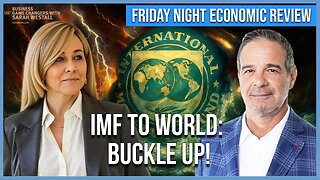 50:27
50:27
Sarah Westall
9 hours agoBig Banks Caught Rigging Market, IMF tells World to “Buckle Up” w/ Andy Schectman
43.6K19 -
 13:54
13:54
Degenerate Jay
16 hours ago $1.15 earned5 Best Superhero Movies To Watch On Halloween
22.9K5 -
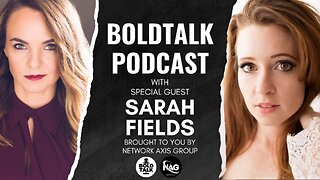 59:03
59:03
NAG Podcast
9 hours agoSarah Fields: BOLDTALK W/Angela Belcamino
39.4K10 -
 1:21:41
1:21:41
Glenn Greenwald
12 hours agoGlenn Takes Your Questions: On the Argentina Bailout, Money in Politics, and More; Plus: Journalist Jasper Nathaniel on Brutality and Settler Attacks in the West Bank | SYSTEM UPDATE #541
92K47 -
 3:10:08
3:10:08
Barry Cunningham
9 hours agoPRESIDENT TRUMP TO USE NUCLEAR OPTION? FOOD STAMPS END! | SHUTDOWN DAY 31
55.6K45 -
 1:06:56
1:06:56
BonginoReport
17 hours agoThe Battle Between Good & Evil w/ Demonologist Rick Hansen - Hayley Caronia (Ep.168)
105K39
